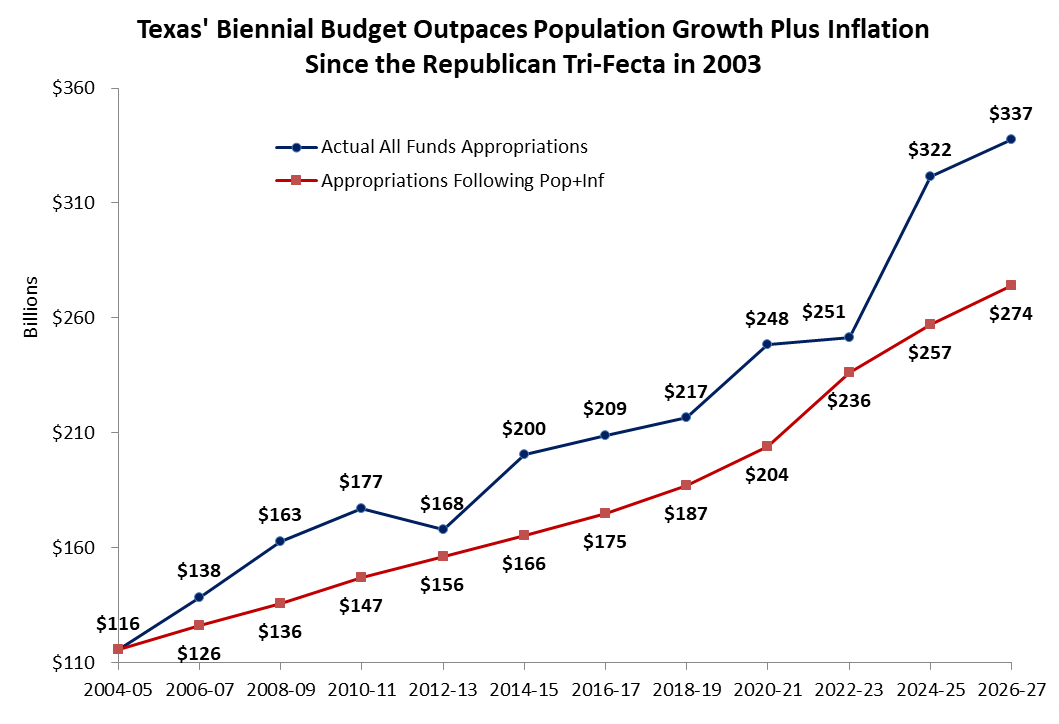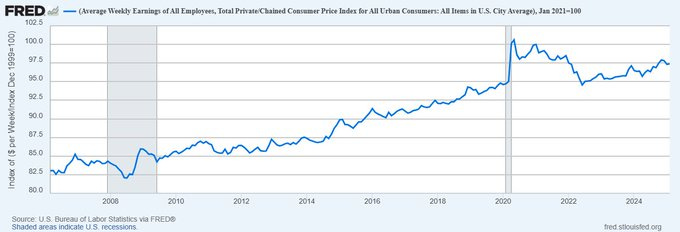Budget Talk Intensifies in DC, Texas, and Across States | This Week's Economy Ep. 107
Politicians keep spending when they should be passing along tax relief.
Hello Friends!
Unfortunately, last week, a Texas-sized budget with California-style spending passed the Texas House with 26 members (19 Republicans and 7 Democrats) voting against it. It will soon go to a conference committee to work out the differences between the two chambers. Instead of focusing on the return of over-collected money earned by hardworking Texans, the budget focuses on progressively expanding government. Texans deserve better!
Meanwhile, Americans are feeling the effects of poor economic policies across the nation, which will only worsen if the Trump administration continues pushing tariffs and ignoring better solutions. Trade agreements, tax cuts, spending restraint, and deregulation offer a more effective path forward, and time is of the essence as March’s jobs report clearly shows weaknesses.
Dive into these issues and more on this week’s episode of This Week’s Economy. Get the full episode on YouTube, Apple Podcast, or Spotify, and visit my website for more information.
1. TARIFF MARKET IMPACTS

In the News:
Extreme volatility in global stock markets has been triggered by President Trump's new tariffs. Trump downplayed concerns, calling the tariffs"medicine" to address long-standing trade deficits. With more tariff threats looming, prices for many goods are expected to rise, potentially leading to job losses and economic uncertainty, particularly in industries dependent on global supply chains. In response, several House Republicans are considering backing Rep. Don Bacon's bill, which would limit the president's authority to impose tariffs unilaterally and require tariffs to expire after 60 days unless approved by Congress. Sources: Axios, The Guardian and PBS News
My Take:
What Congress Can Do: Congress taking a larger role in tariffs and trade decisions is a good step. Additionally, Congress can truly put America first by cutting spending, making the Trump tax cuts permanent, reducing regulations, and forging free trade agreements that benefit everyone.
Trade Deals, Not Wars: Instead of using tariffs to punish Americans and our allies, we should lead in creating a more open global economy. Agreements like the Trans-Pacific Partnership would have strengthened America’s influence and set higher standards for global trade. By walking away, we gave ground to China. It’s time to reverse course—more trade deals that reduce barriers will bolster our leadership and raise incomes both here and abroad.
Trade is Not a Weapon: Trade connects people to greater opportunity, innovation, and peace. When trade flows freely, costs drop, choices expand, and economies grow. Nations that trade are less likely to go to war, while tariff wars only make us poorer and isolate us from partnerships that build global stability.
Related: Watch my recent conversations on tariffs at C-SPAN’s Washington Journal (first video) and CBS News (second video).
2. TEXAS-SIZED BUDGET, CALIFORNIA-STYLE SPENDING
In the News:
The 2026–27 Texas proposed biennial budget was overwhelmingly approved by a 118-26 vote by the House last week, with the most opposition from Republicans in decades. Like previous budgets since 2003, it spends more than what population growth and inflation would justify, burdening taxpayers even more. Sources: Texans for Fiscal Responsibility
My Take:
Expansion of Government: The 2026–27 budget departs from the principles of fiscal responsibility, conservative budgeting, and pro-growth governance that once set Texas apart from states like California, increasing government size at the expense of taxpayers. Instead of focusing on reforms that benefit hardworking Texans, it prioritizes expanding government.
Unchecked Government Bloat: Despite a $24 billion surplus, only $6 billion is directed toward property tax relief. Meanwhile, billions are wasted on corporate welfare and a bloated education budget, neglecting the needs of families and taxpayers who deserve better.
Correcting this Misguided Approach: Texans deserve a government that works for them, not against them. Lawmakers must decide whether to continue with the status quo or return to the core principles that made Texas thrive: small government, lower taxes, and empowering people rather than relying on costly government programs.
Related: I provide a full break down of the 2026-27 Texas budget at Texans for Fiscal Responsibility.
3. JOBS OUTLOOK
In the News:
Despite federal government layoffs and rising concerns over extensive import tariffs, March saw an unexpected surge in hiring. Employers added 228,000 jobs. Source: Bureau of Labor Statistics
My Take:
Deeper Look at Employment: Much of March’s job growth came from government-subsidized sectors like health care (+54K), social assistance (+24K), and transportation (+23K). This isn’t necessarily a sign of a booming private economy, as core sectors like manufacturing, mining, and construction saw little growth.
Wages & Participation: Average hourly earnings rose just 0.3% in March, but real weekly earnings are down 2.6% since Biden took office. Inflation continues to strain household budgets, and we are edging toward stagflation—slow growth with rising prices. The labor force participation rate is stuck at 62.5%, and the employment-population ratio remains at 59.9%, leaving millions sidelined or stuck in part-time work.
Time to Get the Economy Healthy: This is not a healthy economy. It’s a politically managed one. Tariffs, subsidies, and mandates won’t create lasting prosperity. It’s time to embrace free markets, competition, and individual liberty, allowing the people—not politicians—to decide.
Related: I provided a deep dive on the BLS report on X.
4. KANSAS VETOS SANDBOX LEGISLATION
In the News:
Kansas Governor Laura Kelly vetoed House Bill 2291, which aimed to create a regulatory relief division within the Attorney General’s Office and establish an advisory committee to support new businesses and entrepreneurs. Source: Kansas Reflector
My Take:
Loss for Entrepreneurs: Governor Kelly’s veto of this bill shuts down a promising opportunity for entrepreneurs. Instead of fostering growth, the governor chose to maintain the status quo. The proposed regulatory sandbox was designed to help small business owners, startup founders, and innovators by allowing them to test new ideas without being bogged down by outdated regulations.
Flexibility, Not Risk: This wasn’t about reckless deregulation; it was about offering flexibility to new businesses. The sandbox would have let startups operate under adjusted rules, with oversight to ensure consumer protections. It would have been a smart, safe way to support innovation while still safeguarding the public.
Override the Veto: Kansas needs more opportunity, not more red tape. The veto sends a message that Kansas isn’t ready to compete with states leading in innovation. Legislators should override the veto and make Kansas a place where new ideas can thrive, creating jobs and driving growth.
Related: I provide analysis of the impacts of Gov. Kelly’s decision and urge the Legislature to override the veto at Kansas Policy Insitute.
5. EXECUTIVE ORDER TO BOOST COAL

In the News:
President Trump recently signed executive orders aimed at boosting U.S. coal production and preserving coal plants facing closure. The order also directs Energy Secretary Chris Wright to consider designating coal used in steel production as a "critical mineral," which would unlock emergency powers to increase output. This initiative comes in response to rising U.S. electricity demand driven by energy-intensive technologies. Source: Reuters
My Take:
Make Us Energy Independent: Energy independence was a key achievement during Trump’s first term—and it's shaping up to be a priority in his second. Trump is working to reduce Biden-era regulatory barriers, making affordable energy more accessible.
More Energy Moves: There’s still more work to be done. The administration should open federal lands for oil and gas exploration, fast-track pipeline and refinery permits, and eliminate green energy subsidies. These steps would lower costs, create high-paying jobs, and boost national security.
Free Market Policy Benefits: Embracing free market energy policies would help lower energy costs, create jobs, and enhance national security. It would stabilize prices and ensure the U.S. can meet its energy needs without relying on adversarial foreign nations.
Related: Check out my piece in National Review on how the Trump administration can Make Energy Great Again in the early days of his second term.
Thanks for joining me in this episode of "This Week's Economy." For more insights, visit vanceginn.com and get even greater value with a paid subscription to my Substack newsletter at vanceginn.substack.com.
God bless you, and let people prosper!
Keep reading with a 7-day free trial
Subscribe to Let People Prosper to keep reading this post and get 7 days of free access to the full post archives.










